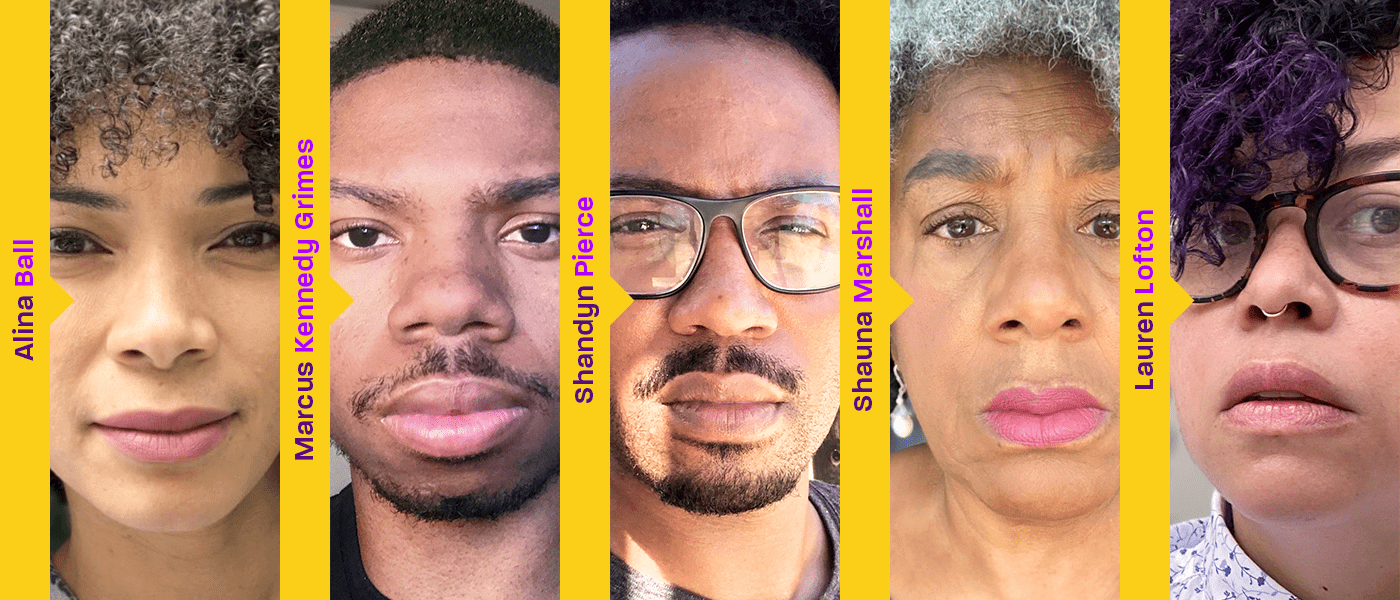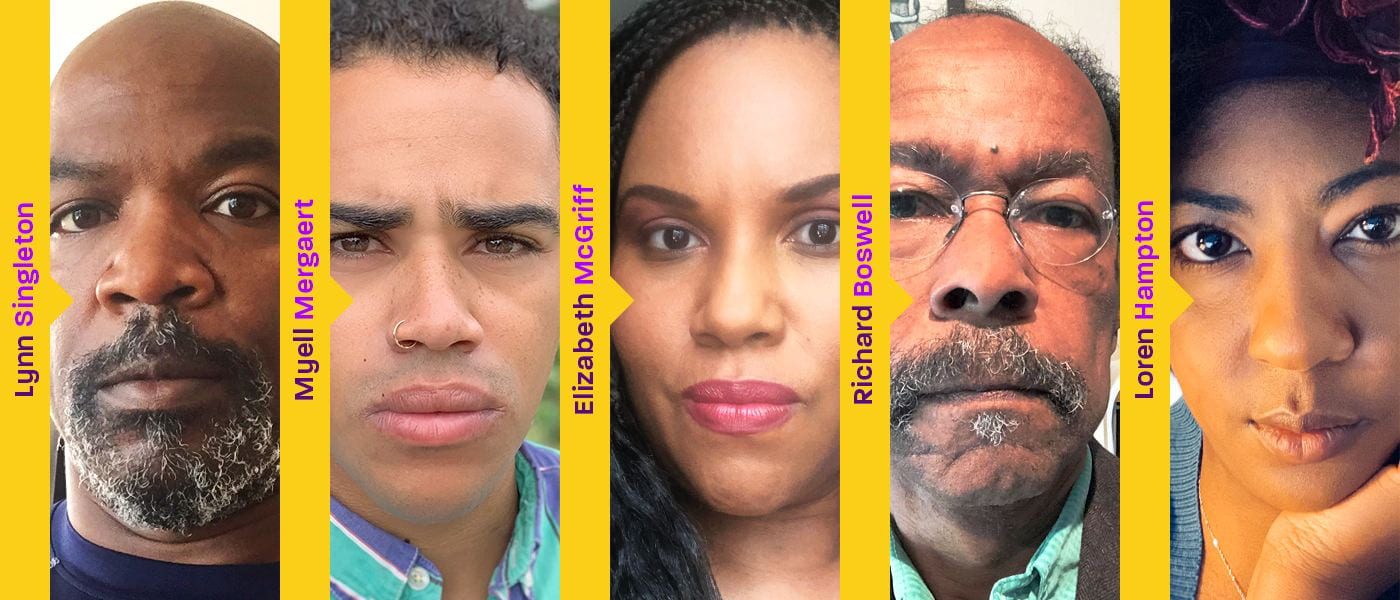New Podcast Highlights Black Voices at Hastings
 UC Law SF’ Center for Racial and Economic Justice (CREJ) has launched Black Hastings Speaks, a six-episode podcast series designed to preserve and present authentic stories of Black experiences within the UC Law SF community.
UC Law SF’ Center for Racial and Economic Justice (CREJ) has launched Black Hastings Speaks, a six-episode podcast series designed to preserve and present authentic stories of Black experiences within the UC Law SF community.
The series of one-on-one conversations between students, faculty, staff, and alumni is modeled on NPR’s StoryCorps. Professors Alina Ball and Shauna Marshall initiated the project in the aftermath of George Floyd’s murder, when exasperation over persistent anti-Black racism erupted nationwide in protests, prompting individuals and institutions to begin speaking with rare urgency about the importance of addressing white supremacy and the need for systemic change.
In episodes ranging from 13 to 30 minutes, participants speak frankly about their experiences, both on campus and off, including life-threatening encounters with police, continually bracing for micro-aggressions, isolation in predominately white institutions, and the exhausting burden of educating a majority that rarely understands its privilege.
“Listening to the rough cut of these interviews for the first time, we were overwhelmed by how beautiful and moving the content was,” said Ball, Co-Director of CREJ.
“We initially planned to have each episode last for about five to seven minutes. But we could not, in good conscience, deprive our community of the learning opportunity our participants entrusted to us. The resulting episodes not only address white supremacy and its impact on Hastings, but also demonstrate resiliency, hope, and profound compassion and connectedness,” Ball said. She is featured in Episode 1 with CREJ Co-Director Marshall.
Rising 2L Loren Hampton, Co-President of UC Law SF’ Black Law Students Association (BLSA), appears in two episodes, Episode 4 with BLSA Co-President Marcus Grimes, and Episode 6 with Elizabeth McGriff, Director of the UC Law SF Legal Education Opportunity Program (LEOP).
“I hope this will be the first of many seasons of Black Hastings Speaks,” Hampton said. “I really appreciated the opportunity to share my experiences in a way that was honest and raw. It’s so important to hear from Black students about the issues we are faced with, because no one can speak to our experiences but us.”
The goal of the project, Hampton said, is to advance productive discourse. “I hope the series will make people uncomfortable enough to change their thoughts and, more importantly, the actions that stem from those thoughts. Now is not the time for cyclical conversations about obvious and agreed upon issues. Now has been and will always be the time for actionable change.”
Three of the five men featured in the series shared stories about being on the receiving end of a police officer’s gun. All five spoke of having a keen understanding of the danger of being Black during encounters with police. In his conversation with Hampton, Grimes explained how terrified he was when he was pulled over as a minor and a frightened cop pulled a gun on him.
“Many fail to recognize the origins of policing in this country,” he said referring to the slave patrols. “This history is one that not only feeds the ungrounded fear some officers have, but also explains why police encounters are too often fatal for African-Americans. Thus, having the ability to open up people’s minds to my own perspective as a black man interacting with police was imperative to me.”
Shandyn Pierce ’20, a former BLSA President, appears in Episode 2 with Myell Mergaert ’20, who was president of ASUCH during his 3L year. “The lived-in reality of many Black law students and what it reveals about these institutions might be painful to hear,” said Pierce, who will join Meyers Nave as an associate after taking the California bar in October. “However, hard truths like these are important and powerful.”
Those truths, and the experiences underlying them, also breed resilience, said Mergaert, who recently took the Washington state bar and will join Liftoff Mobile as Associate General Counsel. “Being Black and queer has given me plenty of experience with difficult conversations. I take pride in the fact that I’ve had these experiences. I am a better person for having dealt with this,” both in life and at law school. “Several UC Law SF faculty and staff gave me the tools to advocate for myself, to fight back, push forward and find resilience. I appreciate standing out for those qualities.”
Anyone interested in supporting CREJ, UC Law SF’ newest center, may make a gift here. Chancellor and Dean David Faigman announced a fundraising campaign in June, setting $150,000 as an initial goal. “As a public institution, we have the responsibility to oppose racial injustice in all its forms; as a law school, we have the skillset to address those injustices,” Faigman said. “We have an obligation to meet this moment, in the wake of the horrific and unjustified killing of George Floyd by police, with actions, not just words.”
UC Law SF faculty who previewed the podcasts welcomed them as a needed platform for discussion. “These podcasts are superb” said Professor of Law and Harry & Lillian Hastings Research Chair Lois A. Weithorn. “Incredibly important listening. We all owe CREJ a great deal of gratitude for producing this series, as it offers the opportunity to integrate new understandings and much wisdom into the frameworks and attitudes we bring to all that we do at UC Law SF.”
CREJ has more anti-racist programming planned for the coming year. “We will continue to challenge with the goal of ultimately refining our intellectual community,” Ball said.
